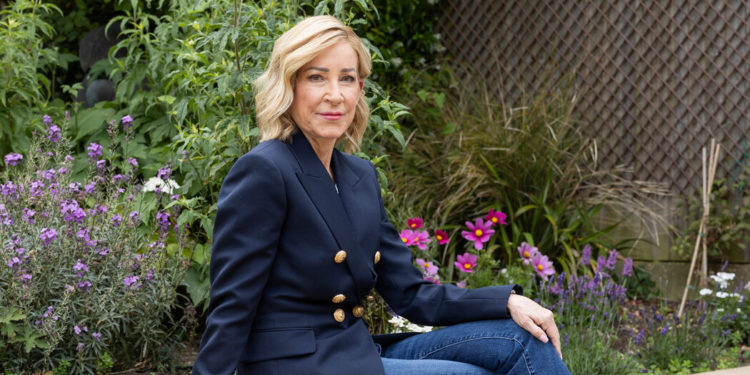Chris Evert’s schedule is packed again. Six months after announcing for the second time that she had cancer, Ms. Evert, one of the greatest champions in sports history, is back to work as a tennis commentator, coach and charitable fund-raiser. She seems to have beaten cancer again.
She was at her home in Florida last week for less than a day, a stopover before a flight to London, where she will work as a broadcaster at Wimbledon for the next two weeks.
In that brief window at home, Ms. Evert, 69, grabbed some sleep, attended to the charity she works for, then packed for her trip. Work, travel and especially family take up her time now, instead of chemotherapy.
She had just flown home from Denver after a visit with her son’s new baby boy. Yes, Ms. Evert, once a steely teenager who won the first of her 18 major tennis championships in 1974, is now a grandmother.
“I’m in love with this little baby already,” she said in a video call. “It makes me want to live even more.”
Two years ago, Ms. Evert publicly detailed her first cancer diagnosis to raise awareness about ovarian cancer, which had killed her younger sister, also a tennis professional, in 2020.
Because of her sister’s diagnosis, Ms. Evert got tested and soon discovered that she had stage 1 ovarian cancer. She had surgery, underwent difficult chemo treatments and lost her hair. But her hair grew back, along with her positive outlook. The cancer was in remission and doctors told her she had a 94 percent chance of a complete recovery.
Ms. Evert returned to work giving on-air analysis at tournaments and helping to run her tennis academy and the charitable arm of the United States Tennis Association, where she has proved a record-setting fund-raiser.
“She’s our superpower,” said Ginny Ehrlich, the foundation’s chief executive.
But she is human. She is just like the legions who must deal with the dreadful news that cancer has returned. A little more than a year after she was in remission, a precautionary CT scan in December revealed a cancerous mass. Ms. Evert went through the entire process a second time, and is happy to report that the cancer is once again gone. She is also very honest with herself.
On the video call, she glanced out a window of her home, pulled at the bill of her baseball cap and flashed a smile.
“Doctors are always hopeful,” she said. “Obviously, if something returned the second time, there’s more of a chance that it’s going to return. Some people have cancer once and it goes away, and they live for 30 or 40 more years. That’s a wonderful story. It’s not always like that. But my doctor told me I won’t die from this.”
The cancer was again stage 1, meaning it had not spread. As with her original diagnosis, early testing was critical — a message Ms. Evert shares zealously. She said that since she was first diagnosed and began talking about genetic testing, five women close to her have also had surgeries.
Ms. Evert underwent her second surgery in December and endured more chemotherapy, which she played down, mostly because she knew what to expect.
“The first four or five days I feel like crap and I’m nauseous and weak and I have bone aches,” she said. “But after four or five days it goes away, and then I have two and a half weeks to feel OK before my next one. With the improvements they’ve made with chemo over the last 25 to 30 years, I can’t complain.”
She was scheduled for six rounds of it but developed an allergic reaction. She had difficulty breathing and her tongue swelled, so she stopped at four. But tests showed she was cancer-free again. The remaining treatment is a regimen of four daily pills for the next two years.
The physical drain of the treatments and the side effects of the medication have left her energy and vitality at 80 percent of what they were before cancer intruded in her life, she says. But she is strong enough to work out, to hold her new grandson, to travel and work.
“You can’t live in fear,” she said. “I just have to keep exercising, try and be as healthy as I can, and be up on all my CT scans and my appointments with the doctor.”
Because the cancer returned, she could not attend the Australian Open in January. But she eased back to work at the French Open in May, doing a week on air for the Eurosport channel. After Wimbledon, she plans to be in New York this summer, covering the U.S. Open for ESPN, and attending the U.S.T.A. Foundation’s gala fund-raiser.
She became the chairwoman of the foundation in 2019 and, despite the cancer, has already worked two years beyond the normal term of previous chairs. During that time, Ms. Evert helped bring in $55 million. Even sophisticated donors tend to get a little awed when they get a call from a Hall of Fame player who won the United States Open six times and the French Open seven times. Ms. Evert also won an astonishing 90 percent of her singles matches.
“We will take Chris Evert for as long as we can,” Ms. Ehrlich said. “She embodies our mission in the way she gives her time and energy to young people.”
And Ms. Evert sees no reason to stop. Even as she was describing how her cancer had returned and then faded again, she wanted to stress the foundation’s latest efforts to keep kids involved in tennis past age 13, when most quit sports.
“I’m not going to stop living my life,” she said. “I’m going to keep going and keep going.”
The post Chris Evert Beat Cancer. Then It Came Back. So She Beat It Again. appeared first on New York Times.


















